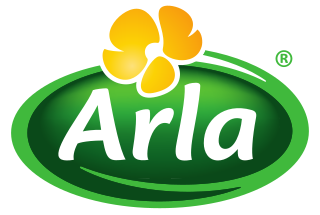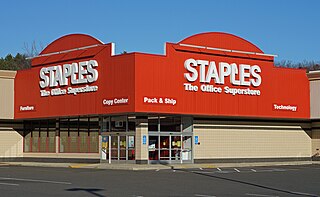
Distribution is the process of making a product or service available for the consumer or business user who needs it, and a distributor is a business involved in the distribution stage of the value chain. Distribution can be done directly by the producer or service provider or by using indirect channels with distributors or intermediaries. Distribution is one of the four elements of the marketing mix: the other three elements being product, pricing, and promotion.
Discounts and allowances are reductions to a basic price of goods or services.

The list price, also known as the manufacturer's suggested retail price (MSRP), or the recommended retail price (RRP), or the suggested retail price (SRP) of a product is the price at which its manufacturer notionally recommends that a retailer sell the product.

Arla Foods Group is a Danish-Swedish multinational co-operative based in Viby, Denmark. It is the fifth biggest dairy company in the world and the largest producer of dairy products in Scandinavia and United Kingdom.

In marketing, a coupon is a ticket or document that can be redeemed for a financial discount or rebate when purchasing a product.

Staples Inc. is an American office supply retail company headquartered in Framingham, Massachusetts.
A retailers' cooperative is a type of cooperative which employs economies of scale on behalf of its retailer members. Retailers' cooperatives use their purchasing power to acquire discounts from manufacturers and often share marketing expenses. A retailers' cooperative is essentially a group of independently owned businesses that pool their resources to purchase in bulk, usually by establishing a central buying organization, and engage in joint promotion efforts. It is common for locally owned grocery stores, hardware stores, and pharmacies to participate in retailers' cooperatives.

The Wonderbra is a type of push-up underwire brassiere that gained worldwide prominence in the 1990s. Although the Wonderbra name was first trademarked in the U.S. in 1955, the brand was developed in Canada. Moses (Moe) Nadler, founder and majority owner of the Canadian Lady Corset Company, licensed the trademark for the Canadian market in 1939. By the 1960s the Canadian Lady brand had become known in Canada as "Wonderbra, the company." In 1961 the company introduced the Model 1300 plunge push-up bra. This bra became one of the best-selling Canadian styles and is virtually identical to today's Wonderbra.

Mountain Equipment Co-op was a Canadian co-op that started the MEC outdoor gear retail brand. The MEC brand name, assets and store leases were purchased by the American private investment firm Kingswood Capital Management's subsidiary Mountain Equipment Company in October 2020. 1077 Holdings Co-operative remains active to deal with the remaining claims by creditors and will be wound up at some point in the future.

The Co-operative Group Limited, trading as Co-op and formerly known as the Co-operative Wholesale Society, is a British consumer co-operative with a group of retail businesses, including grocery retail and wholesale, legal services, funerals and insurance, and social enterprise.
A slotting fee, slotting allowance, pay-to-stay, or fixed trade spending is a fee charged to produce companies or manufacturers by supermarket distributors (retailers) in order to have their product placed on their shelves or within their supply chain. The fee varies greatly depending on the product, manufacturer, and market conditions. For a new product, the initial slotting fee may be approximately US$25,000 per item in a regional cluster of stores, but may be as high as US$250,000 in high-demand markets.
In marketing, a rebate is a form of buying discount and is an amount paid by way of reduction, return, or refund that is paid retrospectively. It is a type of sales promotion that marketers use primarily as incentives or supplements to product sales. Rebates are also used as a means of enticing price-sensitive consumers into purchasing a product. The mail-in rebate (MIR) is the most common. An MIR entitles the buyer to mail in a coupon, receipt, and barcode in order to receive a check for a particular amount, depending on the particular product, time, and often place of purchase. Rebates are offered by either the retailer or the product manufacturer. Large stores often work in conjunction with manufacturers, usually requiring two or sometimes three separate rebates for each item, and sometimes are valid only at a single store. Rebate forms and special receipts are sometimes printed by the cash register at time of purchase on a separate receipt or available online for download. In some cases, the rebate may be available immediately, in which case it is referred to as an instant rebate. Some rebate programs offer several payout options to consumers, including a paper check, a prepaid card that can be spent immediately without a trip to the bank, or even as a PayPal payout.
BBB National Programs, an independent non-profit organization that oversees more than a dozen national industry self-regulation programs that provide third-party accountability and dispute resolution services to companies, including outside and in-house counsel, consumers, and others in arenas such as privacy, advertising, data collection, child-directed marketing, and more. The Center for Industry Self-Regulation (CISR) is BBB National Programs' 501(c)(3) non-profit foundation. CISR supports responsible business leaders in developing fair, future-proof best practices, and the education of the public on the conditions necessary for industry self-regulation.

The history of bras is closely tied to the social status of women, the evolution of fashion, and shifting views of the female body over time.

A bra, short for brassiere or brassière, is a form-fitting underwear that is primarily used to support and cover a woman's breasts. A typical bra consists of a chest band that wraps around the torso, supporting two breast cups that are held in place by shoulder straps. A bra usually fastens in the back, using a hook and eye fastener, although bras are available in a large range of styles and sizes, including front-fastening and backless designs. Some bras are designed for specific functions, such as nursing bras to facilitate breastfeeding or sports bras to minimize discomfort during exercise.
Checkpoint Systems is an American company that specializes in loss prevention and merchandise visibility for retail companies. It makes products that allow retailers to check inventory, quicken the replenishment cycle, prevent out-of-stocks and reduce theft. Checkpoint offers Electronic Article Surveillance (EAS) radio frequency solutions for retail, high-theft and loss-prevention solutions, RFID hardware, software, and labeling capabilities.
Fashion Originators' Guild of America v. FTC, 312 U.S. 457 (1941), is a 1941 decision of the United States Supreme Court sustaining an order of the Federal Trade Commission against a boycott agreement among manufacturers of "high-fashion" dresses. The purpose of the boycott was to suppress "style piracy". The FTC found the Fashion Guild in violation of § 5 of the FTC Act, because the challenged conduct was a per se violation of § 1 of the Sherman Act.

Underwear, underclothing, or undergarments are items of clothing worn beneath outer clothes, usually in direct contact with the skin, although they may comprise more than a single layer. They serve to keep outer clothing from being soiled or damaged by bodily excretions, to lessen the friction of outerwear against the skin, to shape the body, and to provide concealment or support for parts of it. In cold weather, long underwear is sometimes worn to provide additional warmth. Special types of undergarments have religious significance. Some items of clothing are designed as undergarments, while others, such as T-shirts and certain types of shorts, are appropriate both as underwear and outerwear. If made of suitable material or textile, some underwear can serve as nightwear or swimwear, and some undergarments are intended for sexual attraction or visual appeal.

A bicycle cooperative can take the many forms of the cooperative model. These often include co-ops composed of businesses to achieve economies of scale, co-ops managed by those who work at the business, and bicycle co-ops owned and managed by the cyclists that use their services. To date, many bicycle co-ops have taken the form of community bike shops and cooperatives organized to give the local bike shop national scale and buying power.
United States v. Parke, Davis & Co., 362 U.S. 29 (1960), was a 1960 decision of the United States Supreme Court limiting the so-called Colgate doctrine, which substantially insulates unilateral refusals to deal with price-cutters from the antitrust laws. The Parke, Davis & Co. case held that, when a company goes beyond "the limited dispensation" of Colgate by taking affirmative steps to induce adherence to its suggested prices, it puts together a combination among competitors to fix prices in violation of § 1 of the Sherman Act. In addition, the Court held that when a company abandons an illegal practice because it knows the US Government is investigating it and contemplating suit, it is an abuse of discretion for the trial court to hold the case that follows moot and dismiss it without granting relief sought against the illegal practice.












